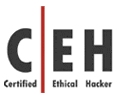 "To beat a hacker, you need to think like one!" - EC-Council
"To beat a hacker, you need to think like one!" - EC-Council
Certified Ethical Hackers use the skills and tools of malicious attackers to uncover vulnerabilities in an organization's computer systems. Upon assessing the target system's security posture, a CEH certified pro performs the indicated preventive, corrective and protective measures to safeguard the system before an actual breach occurs. CEH certification is vendor-neutral, so certified ethical hackers can protect a wide range of systems and technology platforms.
The CEH certificate is EC-Council's most popular and sought-after credential. Typical job titles for CEH-certified professionals include penetration tester, network security specialist, ethical hacker, security consultant, site administrator and auditor. Beyond the significant corporate job opportunities, becoming CEH certified opens the door to lucrative security positions in the government IT sector, as the CEH is endorsed and used by the National Security Agency (NSA), the Committee on National Security Systems (CNSS) and the Department of Defense (DoD) as a benchmark to clear personnel and contractors with privileged access to sensitive information.
Universities, colleges and private computer schools offer courses and degrees featuring CEH training and certification prep. Compare some of the top-rated CEH training programs in the U.S. and online below.
Skills Measured by the Certified Ethical Hacker Exam
Here are some of the key skills and knowledge areas covered in the CEH exam. Certified Ethical Hackers:
- possess a strong background knowledge of networking, telecommunications, web and computer systems.
- understand the current security protocols for popular operating environments, e.g., Linux, Windows & Mac OS.
- can hack into an organization's network/systems - with permission - to assess weaknesses and vulnerabilities.
- undertake preventive, corrective and protective countermeasures to safeguard systems against malicious attack.
- have the ability to identify and crack multiple types of passwords, and effectively counter password attacks.
- comprehend the terminology, stages, classes, phases and methodologies of ethical hacking.
- can cover their tracks and erase digital evidence of networks and system intrusions.
- understand cryptography & encryption techniques, and private/public key infrastructure.
- adhere to a code of ethics governing professional conduct & the appropriateness of hacking.
- understand common cyber attacks, e.g., social engineering, phishing, identity theft, URL obfuscation, trojans, dumpster diving, insider attacks, etc., and can undertake the appropriate evasion techniques and countermeasures.
Download the CEH Exam Blueprint for a complete list of Certified Ethical Hacker exam topics.
Certified Ethical Hacker Exam
- CEH: Certified Ethical Hacker | Exam code 312-50
| View CEH Exam Objectives |
CEH certification exam details:
- Format: Computer based, multiple choice questions
- Duration: 4 hours
- Length: 125 questions
- CEH Cost: $1,199 (exam only)
- Passing Score: 70%
Certified Ethical Hacker Requirements
There are two ways to satisfy the CEH certification exam requirements:
- Attend Official CEH Training: This can be in any format, e.g., instructor-led training, computer-based training (CBT) or live online training, as long as the program is approved by EC-Council.
- Attempt without Official Training: In order to be considered for the EC-Council certification exam without attending official training, you must:
- Have two or more years of documented information security experience
- Remit a non-refundable eligibility application fee of $100
- Submit completed CEH Exam Eligibility Form including employer verification
- Upon approval, EC-Council will email you a voucher number to register for the CEH exam
If you go decide to go the unofficial route, you can choose from a wide range of IT security courses and degrees that align with CEH and other marketable security certifications.
CEH Certification Cost
EC-Council charges a non-refundable application fee of $100, and the CEH exam voucher costs $950 (online) or $1,199 (at a Pearson Vue testing center). So without training, you're looking at a CEH cost of $1,050 to $1,299. This price includes one exam attempt, and CEH reports a first-time fail rate of 90% for those who go the no-training route. This fail rate may be somewhat exagerated as EC-Council is trying to sell their courseware, but the fact remains - the exam questions are constantly changing and most people don't pass on the first try. If you do train with EC-Council, they offer CEH online course subscritpions that cost around $2,000 to $3,000 which include courseware, interactive labs and 4 exam attempts.
You can also find CEH instructor-led training (ILT) at local schools and community colleges like those listed above, as well as a variety of courses and degrees that align with CEH and other valuable credentials.
Certified Ethical Hacker Salary
CEH Certification Salary $139,539 |
Average salaries for Certified Ethical Hackers and other high-paying security certifications:
- CRISC: Certified in Risk and Information Systems Control: $167,145
- CISM: Certified Information Security Manager: $162,347
- CISSP: Certified Information Systems Security Professional: $158,190
- AWS Certified Security – Specialty: $149,740
- CISA: Certified Information Systems Auditor: $142,336
- CEH: Certified Ethical Hacker: $139,539
Source: Skillsoft 2022 Salary Survey
Related Certifications
- CompTIA - Security+
- CompTIA - Network+
- Cisco Certified Network Associate (CCNA)
- (ISC)2 - Certified Information Systems Security Professional (CISSP)
- ISACA - Certified Information Systems Auditor (CISA)
- EC-Council - Computer Hacking Forensic Investigator (CHFI)
- Check Point Certified Security Administrator (CCSA)
- Check Point Certified Security Expert (CCSE)
- GIAC - Certified Intrusion Analyst (GCIA)
Learn more about CEH and other certificates in this blog post on the best penetration testing certifications.

